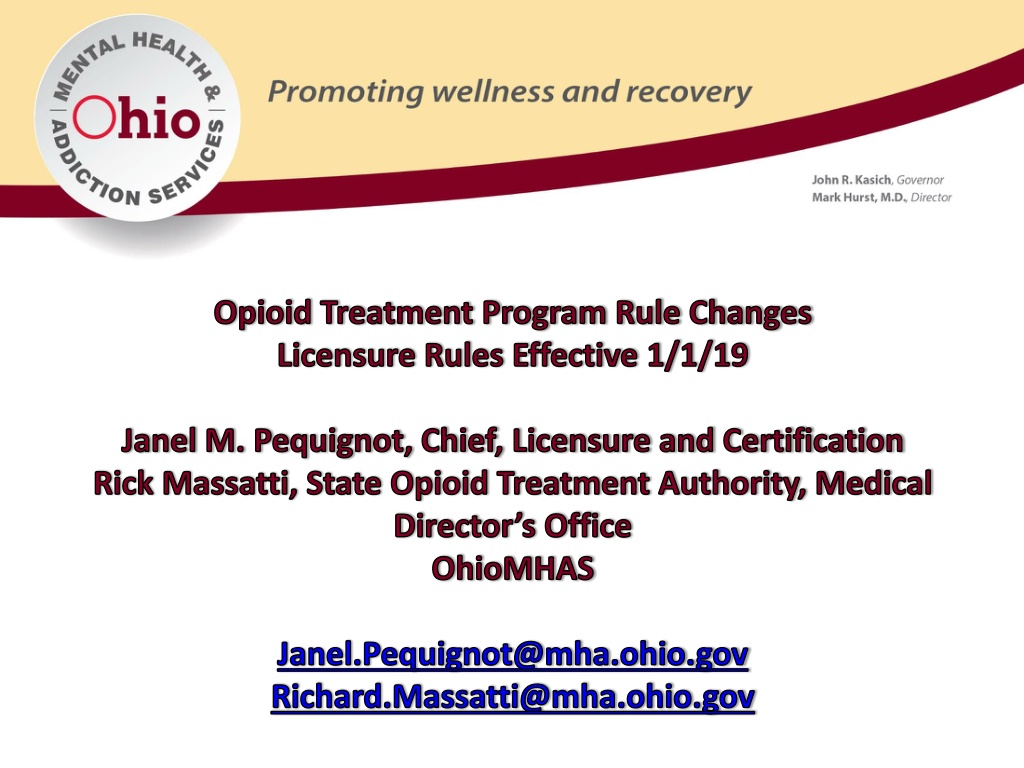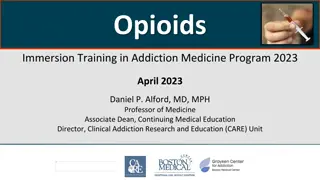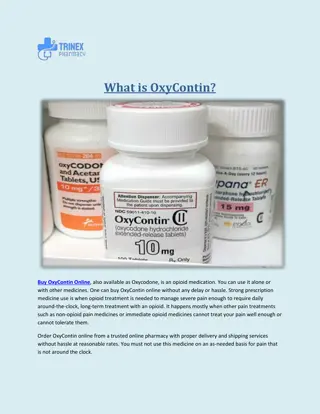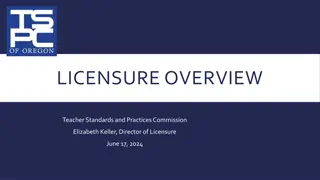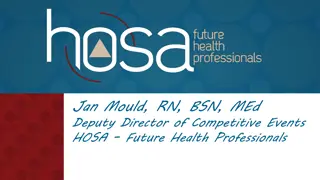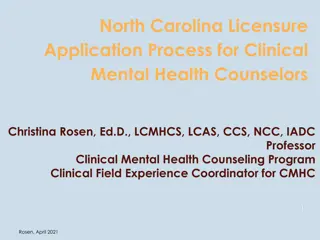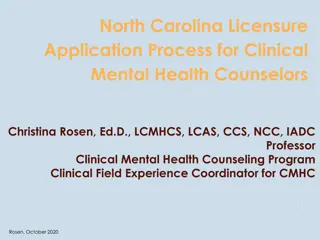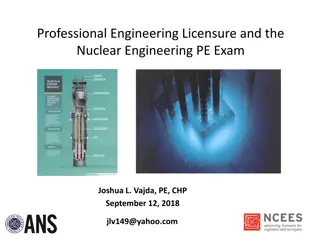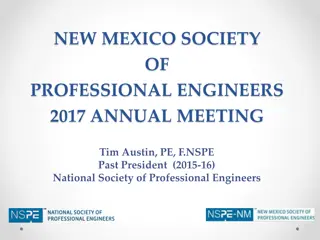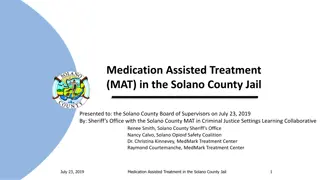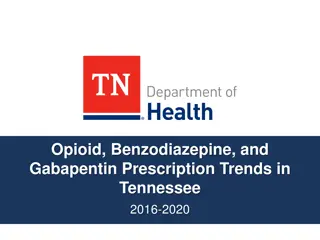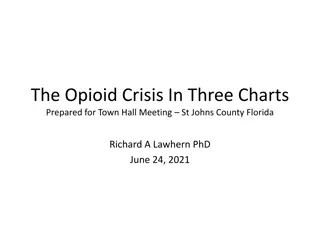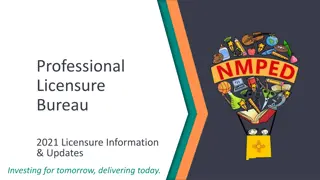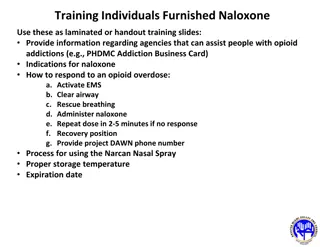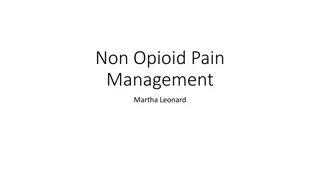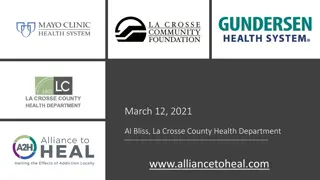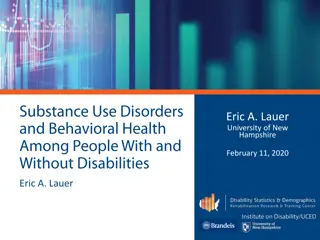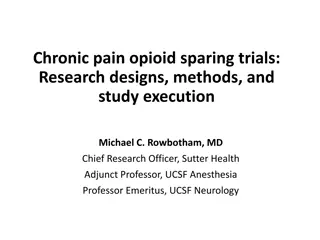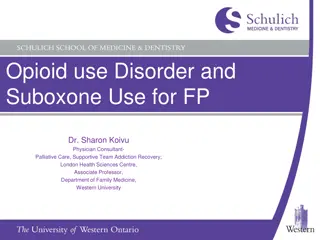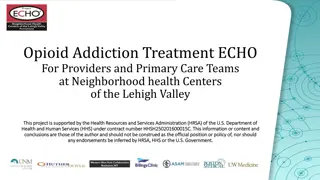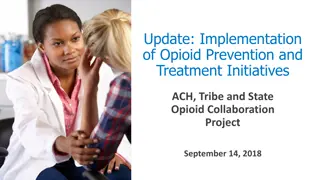OhioMHAS Opioid Treatment Program Rule Changes Licensure Updates
Effective January 1, 2019, OhioMHAS has implemented rule changes for Opioid Treatment Programs. Janel M. Pequignot, Chief of Licensure and Certification, and Rick Massatti, State Opioid Treatment Authority, are overseeing these changes. For more information, contact Janel.Pequignot@mha.ohio.gov or Richard.Massatti@mha.ohio.gov.
Download Presentation

Please find below an Image/Link to download the presentation.
The content on the website is provided AS IS for your information and personal use only. It may not be sold, licensed, or shared on other websites without obtaining consent from the author. Download presentation by click this link. If you encounter any issues during the download, it is possible that the publisher has removed the file from their server.
E N D
Presentation Transcript
Opioid Treatment Program Rule Changes Licensure Rules Effective 1/1/19 Janel M. Pequignot, Chief, Licensure and Certification Rick Massatti, State Opioid Treatment Authority, Medical Director s Office OhioMHAS Janel.Pequignot@mha.ohio.gov Richard.Massatti@mha.ohio.gov
How to Participate in Todays Webinar 1. Download or print attachments from your control panel. 2. Type questions in the Question box of your control panel and send them. 3. For questions about specific rules, it is helpful to include the rule and paragraph - ex: 02 (B)(2)(i). 4. At end of each section, MHAS will read and answer questions submitted in writing. 5. Time permitting, will allow individuals to ask questions or make comments verbally at end of webinar. You will need to raise your hand on your control panel. You must be connected to audio via phone or microphone.
What This Webinar Will and Will Not Cover Will Cover 1. Changes to OAC Chapter 5122-40 Effective Date 1 January 2019 Will NOT Cover 1. Minor or technical changes 2. Entire Chapter 5122-40. Comprehensive rule webinar schedule: OTP Part 1 12/7/18, 10:00 1:00 https://register.gotowebinar.com/register/479099391901 558273 OTP Part 2 12/11/18, 12:30 3:00 https://register.gotowebinar.com/register/592125533888 1388033 OTP Part 3 12/18/18, 12:30 3:00 https://register.gotowebinar.com/register/302861286952 8358657
Big Ticket Changes 1. Requires licensure of SAMSHA Certified (non- methadone) Opioid Treatment Programs 2. Updating some portions of rules for clarity, to improve and assure quality, and in response to provider feedback 3. New rule OAC 5122-40-15 Medication Units
Ohio Revised Code Amended June 29, 2018 5119.391 Methadone Treatment License 5119.392 Methadone Treatment Locations Amended June 29, 2018 and Repealed Effective June 29, 2019 5119.37 Requirements to Operate Opioid Addiction Treatment Programs 5119.371 Location of Opioid Treatment Programs
OAC Rule 5122-40-01 Definitions and Applicability
Key Concepts Definitions used through Chapter 5122-40 Who must apply for opioid tx program licensure Who is exempt from opioid tx program licensure
5122-40-01 (A) continued (A) In addition to the definitions listed in rule 5122-24-01 of the Administrative code, the following definitions apply to Chapter 5122-40 of the Administrative Code. (7) "Medication-assisted treatment" has the same meaning as in section 340.01 of the Revised Code.
ORC 340.01 (A) As used in this chapter: (2) "Medication-assisted treatment" means alcohol and drug addiction services that are accompanied by medication approved by the United States food and drug administration for the treatment of alcoholism or drug addiction, prevention of relapse of alcoholism or drug addiction, or both.
5122-40-01 (A) continued (A) In addition to the definitions listed in rule 5122-24-01 of the Administrative code, the following definitions apply to Chapter 5122-40 of the Administrative Code. (9) "Medication unit" means any center for substance abuse treatment (CSAT) approved facility established as part of, but geographically separate from, an opioid treatment program from which mediation assisted treatment is administered or dispensed.a unit established by a methadone medication maintenance program solely to dispense methadone medication for observed ingestion.
5122-40-01 (A) continued (A) In addition to the definitions listed in rule 5122-24-01 of the Administrative code, the following definitions apply to Chapter 5122-40 of the Administrative Code. (10) "Methadone Medication maintenance" means the administering or dispensing of methadone medication assisted treatment at stable dosage levels for a period in excess of twenty-one days in the treatment of a patient for opioid addiction. (11) "Methadone Opioid treatment program" or "program" means a community addiction services provider engaged in the treatment of individuals with opioid dependence through on-site administration or dispensing of an opioid treatment medication in the form of methadone medicationthat engages in supervised assessment and treatment, using any form of medication assisted treatment for individuals who have opioid use disorders. Services include medically supervised withdrawal and/or maintenance treatment, along with various levels of medical, psychiatric, psychosocial, and other types of supportive care.
5122-40-01 (A) continued (A) In addition to the definitions listed in rule 5122-24-01 of the Administrative code, the following definitions apply to Chapter 5122-40 of the Administrative Code. (13) Permanent patient transfer means the transfer of a patient from one opioid treatment program to another opioid treatment program. (15) "Principal" means a person who has controlling authority or is in a leading position, e.g., executive director, chief financial officer, chief clinical officer, chief operating officer.
5122-40-01 (B) (B) This Chapter is applicable to any community addiction services provider subject to methadone medication licensure as an opioid treatment program in accordance with section 5119.391 of the Revised Code through June 29, 2019 and section 5119.37 of the Revised Code after June 29,2019, which includes any opioid treatment program requiring certification, as certification is defined in 42 C.F.R. 8.2. program that employs methadone medication treatment; or prescribes, dispenses, or administers methadone for the treatment of opioid addiction.
OAC Rule 5122-40-02 State Opiate Treatment Authority (No Significant Changes)
Key Concepts Duties of State Opiate Treatment Authority (SOTA) Requirements in rule are not applicable to providers, although they do correlate with other rules in this chapter, and state and federal requirements
OAC Rule 5122-40-03 Issuance of Licenses
Key Concepts Providers must be in compliance with standards in order for MHAS to issue OTP license License issued for one year License is not transferable Surveys, MHAS access to records and program areas, Plans of Corrections (POC) Provider must re-apply for renewal Conditions under which MHAS may propose to deny or revoke licensure
5122-40-03 (E)(F) (E) A license is valid only for the applicant licensed provider named in the application, and is not transferable to or assumable by any other person, corporation, or entity, including any person or entity which purchases the licensed program or the licensed program s corporate or managing entity, or enters into any similar purchase agreement.
5122-40-03 (K) (K) The department may grant a waiver or variance to the provisions of this chapter. However, requests for waivers and variances that would adversely affect the quality of services or the health and safety of patients will not be granted. (1) A provider shall submit a written request to the department for a waiver or variance. The written request shall state clearly the rationale and need for the requested waiver or variance. (2) The waiver shall be for a period of time determined by the department, not to exceed the expiration date of the current license and is not renewable.
5122-40-03 (L) (continued) (L) The department may refuse to issue or revoke a license of an opioid treatment program for one or more of the following reasons: (11) The program, provider, owner, sponsor, medical director, administrator, or principal of the provider is not in good standing in any other jurisdiction in which the methadone provideropioid treatment program currently provides services, or was not in good standing at all times within the past five three years in any other jurisdiction in which the program previously provided substance use treatment services, that are comparable to the methadone opioid treatment program services authorized under section 5119.391 of the Revised Code until June 29, 2019 or section 5119.37 of the Revised Code after June 29, 2019; or,
5122-40-03 (L) (continued) (L) The department may refuse to issue or revoke a license of an opioid treatment program for one or more of the following reasons: (12) The applicant, operator, owner, sponsor, or medical director, administrator, or principal is or has been a principal with a methadone opioid treatment program that has had a previous license to operate in Ohio revoked or denied renewal for any reason other than nonpayment of the license fee unless: (a) A minimum period of three years has passed from the date of the director's order denying the issuance of an initial license or a minimum period of five three years has passed from the date of the director's order revoking a license or denying the renewal of a license; and, (b) The licensure revocation or non-renewal was not due to any act or omission that is a violation of any provision of section 3719.61 of the Revised Code, or any other state or federal law or rule relating to drug abuse.
5122-40-03 (L) (continued) (L) The department may refuse to issue or revoke a license of an opioid treatment program for one or more of the following reasons: (13) The program fails to timely notify the department of any adverse action or proposed adverse action as required by rule 5122-40-04.
5122-40-03 (O) (O) Termination of licenses (1) A license shall be considered terminated and invalid in the following circumstances: (a) The program has voluntarily discontinued operations; or, (b) An application for renewal has not been received by the department ninety days prior to the expiration of the license.
OAC Rule 5122-40-04 General Licensure Requirements
Key Concepts Licensure requirements MHAS Federal Accreditation Program cannot be on a parcel of real estate that is within a radius of 500 linear feet of a parcel of real estate of certain entities specified in law
5122-40-04 (A) (continued) (A) An alcohol and drug addiction program desiring to obtain an initial license or renew a license as an opioid treatment program shall: (3) Submit a renewal application at least ninety days prior to the expiration of the current license.
5122-40-04 (A) (continued) (A) An alcohol and drug addiction program desiring to obtain an initial license or renew a license as an opioid treatment program shall: (11) Be in good standing with the state board of pharmacy, department of medicaid, medicarecenters for medicare & medicaid services, Ohio department of medicaid, and the United States drug enforcement administration;
5122-40-04 (A) (continued) (A) An alcohol and drug addiction program desiring to obtain an initial license or renew a license as an opioid treatment program shall: (12) Be in good standing in any other jurisdiction in which the methadone provider currently provides services or was in good standing at all times in any other jurisdiction in which the methadone provider previously provided services within the past five years, that are comparable to the methadone treatment services authorized underas defined by division (C)(1) of section 5119.391 of the Revised Code until June 29, 2019 and division (C)(1) of section 5119.37 of the Revised Code after June 29, 2019;
ORC 5119.391/ORC 5119.37 (A) An alcohol and drug addiction program desiring to obtain an initial license or renew a license as an opioid treatment program shall: (C) The department may issue a license to maintain methadone treatment/operate an opioid treatment program to a community addiction services provider only if all of the following apply: (1) During the three-year period immediately preceding the date of application, the provider or any owner, sponsor, medical director, administrator, or principal of the provider has been in good standing to operate a/an methadone/ opioid treatment program in all other locations where the provider or such other person has been operating a similar program, as evidenced by both of the following:
ORC 5119.391 (A) An alcohol and drug addiction program desiring to obtain an initial license or renew a license as an opioid treatment program shall: (C) The department may issue a license to maintain methadone treatment to a community addiction services provider only if all of the following apply: (1) During the three-year period immediately preceding the date of application, the provider or any owner, sponsor, medical director, administrator, or principal of the provider has been in good standing to operate a methadone treatment program in all other locations where the provider or such other person has been operating a similar program, as evidenced by both of the following: (a) Not having been denied a license, certificate, or similar approval to operate a/an methadone/opioid treatment program by this state or another jurisdiction; (b) Not having been the subject of any of the following in this state or another jurisdiction: (i) An action that resulted in the suspension or revocation of the license, certificate, or similar approval of the provider or other person;
ORC 5119.391 (A) An alcohol and drug addiction program desiring to obtain an initial license or renew a license as an opioid treatment program shall: (C) The department may issue a license to maintain methadone treatment to a community addiction services provider only if all of the following apply: (1) During the three-year period immediately preceding the date of application, the provider or any owner, sponsor, medical director, administrator, or principal of the provider has been in good standing to operate a methadone treatment program in all other locations where the provider or such other person has been operating a similar program, as evidenced by both of the following: (b) Not having been the subject of any of the following in this state or another jurisdiction: (ii) A voluntary relinquishment, withdrawal, or other action taken by the provider or other person to avoid suspension or revocation of the license, certificate, or similar approval; (iii) A disciplinary action that was based, in whole or in part, on the provider or other person engaging in the inappropriate prescribing, dispensing, administering, personally furnishing, diverting, storing, supplying, compounding, or selling of a controlled substance or other dangerous drug.
5122-40-04 (B) (B) Geographic restrictions: (1) A program applying for an initial license shall not be issued a license if there is a public or private school, licensed child day- care center, or other child-serving agency within a radius of five hundred linear feet of the location where the methadone treatment program is to operate the provider is requesting an initial license for a particular location that is located on a parcel of real estate that is within a radius of five hundred linear feet of the boundaries of a parcel of real estate having situated on it a public or private school, child day-care center licensed under Chapter 5104. of the Revised Code, or child-serving agency regulated by the department under Chapter 5119 of the Revised Code.
Database Child Care Centers: http://childcaresearch.ohio.gov/
5122-40-04 (C) (continued) (C) An opioid treatment provider shall inform the department of any adverse action or proposed adverse action that is issued to the provider or owner, or is issued to any other program, corporation, entity or partnership with which the opiate treatment program s sponsor, medical director, administrator or a principal is associated. Adverse action is defined as a notice issued by a state, province federal or similar licensing or regulatory authority to deny, revoke, suspend, place on probation or take similar action against a provider s license, certificate or other approval to operate an opioid treatment program. Notice provided to the department shall consist of a
5122-40-04 (C) (C) Notice provided to the department shall consist of a copy of the notice of adverse action or proposed adverse action, and all of that opioid treatment program s compliance or monitoring reports issued for the prior three-year period. The opioid treatment provider shall provide this information to the Department at the following times: (1) At the time of initial or renewal application; and, (2) Within seven days of receipt of notice.
5122-40-04 (D) (D) Upon receipt of an application, the department shall review the materials to determine if they are complete. If an application is incomplete, the department shall notify the applicant of corrections or additions needed, and may return the materials to the applicant. Incomplete materials shall not be considered an application for licensure, and return of the materials or failure to issue a license shall not constitute a denial of an application for licensure.
OAC Rule 5122-40-05 Personnel
Key Concepts Program Sponsor Medical Director Site level and, if applicable, regional Program Administrator Site level and, if applicable, regional Counselor to patient ratio 1:65
5122-40-05 (B) (B) Each methadone opioid treatment program shall have a designated medical director. (1) The medical director shall be a physician licensed to practice medicine or osteopathy in the state of Ohio and shall have either: (a) Certification from the American board of addiction medicine; (b) Certification from a member board of medical subspecialties with an addiction subspecialty; or, (c) Certification from the American academy of health care providers in the addictive disorders as a certified addiction specialist; or, (d) A written plan to attain competence in opioid treatment within a probationary time period.
5122-40-05 (B) (continued) (B) Each methadone treatment program shall have a designated medical director. (3) Each opioid treatment program shall have at least one medical director per program location. These site-level medical directors shall be present at the opioid treatment program at least forty percent of the time that the program administers or dispenses medication. Site-level medical directors may serve in their same capacity at additional sites as long as they are present at the ancillary opioid treatment programs at least forty per cent of the time that the program administers or dispenses medication and can satisfactorily discharge all of their duties for each program. (a) Opioid treatment programs may appoint one additional person who meets the qualifications in (B)(1) of this rule to be a co-medical director. Co-medical director s may both contribute to the organization s requirements to be on staff for at least forty percent of the time that the program administers or dispenses medication. (b) Opioid treatment programs that employ co-medical directors shall inform the department of such an arrangement in writing.
5122-40-05 (B) (continued) (B) Each methadone treatment program shall have a designated medical director. (4) Opioid treatment programs in the first sixty days of operation may reduce the time requirement medical directors must be present on site to at least twenty percent of the time that the program administers or dispenses medication. On the sixty-first day of operation the program shall be subject to the requirements of paragraph (B)(3) of this rule.
5122-40-05 (D) (continued) (4) The medical director or a program physician at the opioid treatment program shall meet with each patient within seventy-two hours of the assessment and at least once every six months thereafter during treatment. Each meeting shall be documented in the patient s record.
5122-40-05 (D) (continued) (5) Opioid treatment programs that utilize certified nurse practitioners to personally furnish medication assisted treatment shall have certified nurse practitioners meet with their patients at least once every three months during treatment. Each meeting shall be documented in the patient s record. (a) Certified nurse practitioners personally furnishing medication assisted treatment shall have a standard care arrangement with the opioid treatment programs medical director pursuant section 4723.431 of the Revised Code. If the medical director has five existing certified nurse practitioners with a standard of care arrangement, then the standard of care arrangement shall be between a certified nurse practitioner and a program physician employed by the opioid treatment program.
5122-40-05 (D) (continued) (5) Opioid treatment programs that utilize certified nurse practitioners to personally furnish medication assisted treatment shall have certified nurse practitioners meet with their patients at least once every three months during treatment. Each meeting shall be documented in the patient s record. (b) Use of a certified nurse practitioner to personally furnish medication assisted treatment does not remove the obligation of a medical director or program physician to meet with patients.
OAC Rule 5122-40-06 Medication Assisted Treatment Administration
Key Concepts Standards for prescribing, administering and dispensing medications in accordance with state and federal laws Take-home doses Guest dosing Interim maintenance Pregnant patients
5122-40-06 (F) (F) Dispensing or personally furnishing methadone medication assisted treatment shall be performed in accordance with rules adopted by the state board of pharmacy and may only be done by individuals who have one or more of the following credentials from the applicable state of Ohio board: (1) Licensed physician; or, (2) Pharmacist pursuant to section 4729.39 of the Revised Code.; or, (3) Certified nurse practitioner with an exemption request approved by SAMHSA and the state authority.
5122-40-06 (K) (K) Methadone Opioid treatment programs shall be open and administer medication at least six days per week every week, except that programs may close on federal holidays indicated in paragraph (N) of this rule. Upon approval of an exception request from the state authority and SAMHSA, opioid treatment programs may close for one business day twice per year for administrative planning purposes. Closure dates may not be within the same sixth month period.
